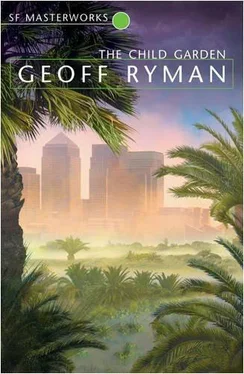The shops on the corner were closing early. A plump, bald man, only nineteen years old, but afflicted with the signs of middle age, folded bamboo shutters over his windows. There was no night trade now, with the opera. He lived with other families in rooms above the shop. On the roof, the shopowner’s wife and his children and the What Does cousins were gathering setting up pears or tables, carrying basins of food, preparing a party.
Two miles away, along the river, fishermen were pulling in lines. There were bonfires on wasteground, where people were gathering to share the last night of the opera. In parks, bamboo platforms had been erected, onto which the Comedy was cubed when there was heavy cloud. Much of the Comedy had been obscured by cloud, but tonight, the sky was autumnal and clear. Even so, technicians were carrying out final checks on the equipment. Holograms of giant roses and human hands flickered in and out of existence. The platforms would serve if there was a sudden front of warm moist air. Overhead there were balloons which would see the advancing front of weather and give warning.
In Archbishop’s Park one of the workmen finished a bottle of beer. His head tilted backwards to receive the last drop, and overhead he saw the spangle of stars. Another workman was peeing half-seen behind a bush. A tug moved in the direction of St Thomas’s Hospital, with the current of the Thames. It swung up and down in the wash of a bigger barge. Lights from the hospital glowed.
In London’s two hundred and ninety-two hospitals over fifty women were in labour at that very moment. One of them bit her lip and pushed, and there was a sense of breakthrough, and the head of newborn was free. Another newborn was slapped, and began to wail. It began to wail, just as Zoe turned in the doorway; as the coffee vendors nodded; and as a laughing man in a pub seemed suddenly to slip and fall, knocking mugs from the counter. His heart had failed. In the kitchen of a kaff, near the Cut, amid a clatter of pots and pans, a twelve year old sharing in the cooking poured boiling water over herself. A man finished positioning his favourite stuffed chair in the middle of the street, to watch the show in the air. Three doors down a young man moved from one foot to another, nervously waiting for a girl he only partly knew.
It can’t be done. Now cannot be imagined or described, not all at once. We have to string it on a thread, in imitation of the way we view the past. In imitation of the way we view ourselves. If you try to tell the whole truth, you never stop talking. And so we tell stories, histories, instead.
‘Time is money,’ said Rolfa’s father.
‘Who were you today?’ Mike Stone asked gently.
Milena was sitting on the balcony of her hospital suite. There were no sharp corners in the hospital suite. It was made of Coral and had grown like flesh. The floor of the balcony flowed upwards to make a wall. The top of the wall rose and fell with a line as natural as that of a tree branch. The walls were covered with plaster because the Coral could sting.
The Coral had chewed up rubble from the older buildings of St Thomas’s Hospital and laid it in genetically-determined patterns. Milena’s genetic balcony looked over the Thames. There were moored barges strung with lights and full of people. The windows of the West were full of people. The West was a sandy-coloured swelling of Coral where the Houses of Parliament had once been, across the river.
Below was the embankment pathway that Rolfa and Milena had walked along on their last day together. Milena remembered looking up at the hospital then. Now she was here, ill, and the wide pavements of that walkway were filled with Bees. They sat in respectful silence, looking up at her. Oh well, thought Milena, leave them be, it’s the last night of the Comedy.
The souvenirs of her life were scattered about her. There were not many. There was her attempt to orchestrate the Comedy. It was bound in a notebook. Music by Rolfa Patel said the first sheet. Orchestrated by Milena Shibush. There was a dirty lump of felt invested with personality called Piglet. There were Rolfa’s papers, and some Coral jewellery that Mike had bought for her. There was the paper Cilia had given her, and the music that Jacob the Postperson had remembered. In a box of earth on the wall, mere were herbs. They had been grown out of the wall of the Bulge and Mike had brought them home. They were dying.
There was a hard, hot swelling in Milena’s stomach, and her arms and fingers were as delicate as a robin’s foot. All her skin was fluorescent now. It gave off a dull, orange glow, with brilliant threads in it where nerves ended in the surface of the skin. There was a huge, gathering knot of flesh just above her shoulder.
Even the Party had stopped telling Milena that she was going to get well. They still insisted that she had many months to live and refused to accept what Milena herself knew, that she was weakening. As she weakened, her empathy virus grew stronger.
‘Who were you today?’ Mike Stone had asked.
‘I was…’ she paused, actress-like for effect. ‘One of the attendants downstairs in the laundry. The short one with the wig, I think. I was very tired and had flat feet, but I was in love with Flo. You know Flo, the one who always says hello. I don’t think I really knew it, but Flo made my life worth living. We just talked, folding towels and sheets. The soap on them brought our hands out in a rash. Flo’s family live in the outreaches, did you know that? I didn’t quite hear the name of the place. Oxbridge? Boxbridge?’
‘Uxbridge,’ whispered Mike. ‘It’s in the west.’
‘Never been that far out,’ replied Milena.
‘What about when you went up in the Bulge?’
‘That,’ said Milena ‘was moored at Biggin Hill.’
‘That’s far out of town.’
‘It’s south.’
Oh, said Mike in silence.
‘Then,’ said Milena. ‘I came down with an attack of barge girl. I was a nine year old girl helping my mother on a barge. I ran back and forth along the wood in bare feet, but I knew the varnish would stop me getting splinters. I had lines trailing in the water and I was checking them all for trout or salmon. I had never caught a salmon. I was in love with the idea of catching a salmon. Isn’t that strange? Love is the only word for it. I ached to catch a salmon. Meanwhile, I helped with the sails, and checked the tiller. I whistled for my dog. My dog never slipped or fell into the water. And my mother sang.’
Milena paused, living another life.
‘She’ll make a nice thread,’ Milena said. Milena and Al were making a tapestry of what she empathised. They called it ‘A London Symphony’. The pattern had music woven into it, the music of Vaughan Williams.
‘The tapestry sure is pretty,’ said Mike Stone.
The tapestry hung in the air, for those who were Snide to see it. Mike Stone was not Snide.
‘Was Heather helping you? Was Heather there?’ Mike asked.
Milena settled back. ‘Heather’s always there.’ From time to time Heather would emerge, to help drive down the visions that came with Terminal empathy. Milena let her emerge sometimes, to talk to Al. Heather would the too, when Milena did.
‘She’s a big help,’ said Mike. Something in the way he said it was as if he understood.
Milena had grown imperious, on her cushions, under blankets. ‘How would you know?’ She drew the blankets about her, nestling down so that she was looking straight up at the sky. She was cold. ‘I spent the rest of the afternoon wondering what to do about all of this.’ She let a bird-like hand drop towards the things on the floor. ‘Most of that is Rolfa’s. I want the papers to go in trust for her to her sister, Zoe. But not to anyone else in her family, just Zoe. Do you understand?’
Читать дальше












